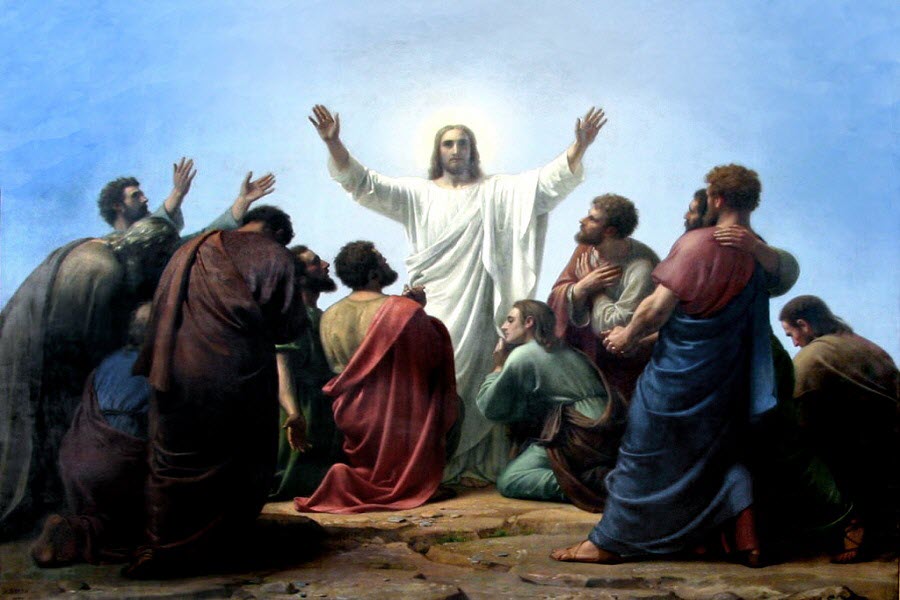Blog & Pastor Letters

Third Sunday of Easter – April 14, 2024
04-14-2024Weekly ReflectionFr. Matthew DuclosIt’s been said that the more you get to know someone, the more you realize that there is so much more to know about that person. If I learn tomorrow that my friend is a rock climber, all of a sudden more questions pop up: When did you start? Where do you go? How do you train? Learning this one fact makes me realize there’s a whole lot more I don’t know about the person.
What does it mean to actually know someone, not just know about them, but to actually know them through and through? Although my parents, married for over 35 years at this point, certainly know each other very well, they are still learning new things about each other.
Today’s passage occurs just after Jesus’ appearance on the Road to Emmaus. Two of them were walking on the road discussing all of the things that had occurred, namely the death and reports of the resurrection of Jesus, and Jesus himself began to walk with them. But, as Luke recounts, they “were prevented from recognizing him.” Only after they invited Jesus to stay with them did the recognize him as he broke bread for them at the table.
We are in this year of Eucharistic Revival, a time for parishes throughout the country to preach and teach about the Real Presence of Christ in the Eucharist. Jesus Christ is fully present, Body, Blood, Soul, and Divinity in the Eucharist, a gift freely given to the Apostles and indeed to each of us. And it is so often through this gift of the Eucharist that we come to encounter Christ, especially at Mass. We share the experience of the early Christians by how we recognize Jesus as the one truly present when we receive Him at the altar.
In the Sacrament of the Eucharist, we are invited into a profound encounter with the living Christ. It’s not merely a symbolic gesture or a remembrance of past events; rather, it’s a sacramental reality where the divine intersects with the human. This profound mystery of faith enables us to not only remember but to actively participate in the salvific work of Christ. As we partake of the Eucharist, we are united with Christ and with one another in a communion of love and grace, echoing the intimacy experienced by the disciples at Emmaus. The Eucharist becomes a pivotal moment where our encounter with Christ transcends the ordinary and leads us to a deeper understanding of his presence among us.
Yet, although the disciples know who Jesus is and they have experienced him first-hand, they are still “startled and terrified” in the presence of Christ. He has to reassure them, inviting them to feel his wounds. He has to teach them that he indeed is the fulfillment of the prophets, he is the Christ who suffered and died and rose on the third day for the forgiveness of sins.
How do we get to know Christ? We can know a lot about him and develop a laundry list of facts and figures that describe things about Jesus, but can we claim, like the Apostles did, to know him? Not know about him, but know him? John’s letter speaks about this in our second reading, he says “those who say, ‘I know him,’ but do not keep his commandments are liars, and the truth is not in them.” Meaning that we learn to know Christ through his commandments, through what he teaches us about how to act.
Understanding Christ involves more than intellectual knowledge; it encompasses a personal, lived experience of his teachings. This experiential knowing is rooted in our daily interactions with his commandments, where we align our actions with his teachings. It’s in the moments of applying his principles to our lives that we truly grasp the essence of who he is. By embodying his love, compassion, and mercy in our actions, we not only understand Christ intellectually but also connect with him on a deeper, spiritual level. This transformative process allows us to move beyond mere acquaintance to a profound intimacy with the Savior, shaping our relationship with him in profound ways.
Our relationship with the Lord is an ongoing one, and we continue to know Him and know about Him. We pray that the Lord continue to shine his face on us, continue to answer us in prayer, to have pity on us and place gladness into our hears. We can know Christ in any number of ways, yet the most powerful is just as his early followers recognized him: through the breaking of the bread.
BACK TO LIST